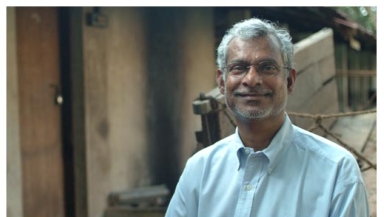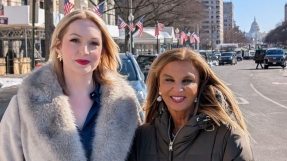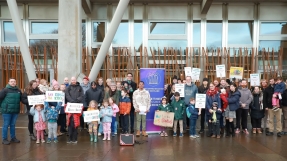
KP Yohannan, the founder of Gospel for Asia, is a quiet world-changer who is helping to bring the love of Christ to the "10/40 Window", which is an area of the world that contains the largest population of non-Christians in the world - two billion of them.
The area extends from 10 degrees to 40 degrees north of the equator, and stretches from North Africa across to China.
Thousands of national missionaries serving with Gospel for Asia are based in 10 countries which include Bangladesh, Cambodia, Sri Lanka, Myanmar (Burma), Nepal and India, and each of them goes through intense training.
But now, following the shocking gang rape and killing of a 23-year-old Indian woman that took place on a bus in New Delhi last December, Yohannan has spoken out for the downtrodden women of India, and also South Asia in particular.
In an interview during the recent NRB 2013 convention in Nashville, Tennessee, Yohannan said, "We often talk about the most unreached people groups in my region of the world, but the truth of the matter remains that maybe the most unreached the suffering forgotten people group in the world are the women, especially in countries like India and some of the Muslim nations.
"Of course you know what happened in Delhi with the raping of this young girl by a group of men. Then she dies and the media now talks about it. They never had that many people marching in Delhi to protesting against what happened. There were hundreds of thousands of people.
"And then the sad thing is that while that was made so public, within a month's time there were reported three or four more cases like that in Delhi and in other parts of India."
Dowry Deaths
Yohannan then pointed out that however shocking these rapes are, many more women are dying in what he called "dowry deaths".
He explained about the dowry system saying, "When a girl gets married, the parents of the girl are expected to give money, or gold and silver; in fact all kind of things, to the boy's family," Yohannan explained. You know in some countries of the world it's the men who give money to girl's family, but this is the reverse.
"This is one of the reasons why hundreds of thousands of baby girls are killed right away when they detect they are girls. You see, to grow up as a woman in the country in the rural communities of India, it takes a lot of money for the wedding dowry.
"So a dowry death takes place when a girl is married and she's not able to bring enough money with her. Then the husband's family will wait but if they don't get it, then many times these women are brutally murdered. It is quite terrible. They pour kerosene on her and set her on fire, claiming it was an accidental kitchen fire."
Yohannan said that in 2008, some 10,000 "dowry deaths" were reported and he added, "I think is a very small percentage of what is really happening."
He then started talking about the incredible difficulties that the women of the Dalit community face. He said the Dalits are the "untouchables" - the lowest caste in India.
"One fourth of the country of India - 280,000,000 people - are the 'untouchables'. That means they are unvalued and looked upon as sub-human. These are the people who suffer the most. 95% of the women among the Dalits are illiterate, and 46% of the women that are married are marrying when they're under the age of 18," he continued.
"The sad thing is that the lack of education makes their life so miserable, so lonely and so alone. There are also untold millions of Dalit widows whose husbands have died. In India, it's believed that when the husband dies, it's because some curse came upon the family because of his wife. And so many times, they are abandoned, rejected, and their children are taken away and they end up on the streets."
New GFA thrust to help Dalit women
Yohannan then told me in view of these terrible statistics, that Gospel for Asia has begun a "major thrust" to help these Dalit women.
"The mortality rate of women who die in India during delivery is the highest in the world and is attributed to lack of information and lack of understanding," he said.
"Think about it - it is reported by the government that over 200,000 babies die a year in India simply because the superstition that when the baby is born you should not give the first milk to the baby. So these newborn babies are not fed the first milk that the mother has.
"They weren't thriving with good nutrition throughout the pregnancy and when the baby goes without all the nutrition in the first milk, they don't have the immunity to resist the sickness, and they die.
"This sad story tells us of the critical need for training and educating these women. We now have hundreds of women missionaries who work among these people teaching them how to read and write and also explaining to them that there's hope and that Jesus loves them and cares for them.
"In Calcutta, where our teams work in the red light district, we have started a school for over 100 children from these women who work in the sex trade. These children are given education and hope for the future and these women are given counseling and are then rescued and taught by our missionaries, and are trained in some other trade. Not only do they come to know Jesus Christ in their life, but also they find a way to make a living without having to sell their bodies for a living.
"And so, very practically, we have women reaching women. These women missionaries are ministering to other women just for the same reason mentioned in the gospel of John 4, where we read that the disciples were confused because Jesus was talking to a woman. The social restrictions make it difficult for the men to minister to these women in the rural communities especially in Nepal and Bangladesh and India. It's in these places that we have a tremendous emphasis on women being trained as missionaries and going and reaching these people. And it's working very well."
He then explained more about the plight of the Dalits, saying, "I usually tell people that if you want to understand the plight of the Dalits, we have to go back and read about the days of slavery in the United States for the blacks and multiply that by maybe twenty times to understand the suffering and the abuse of these downtrodden people.
"The caste system was created basically to control people and is a religious system. Even if, by accident, you happen to touch the body of an upper caste, it is a crime for which they can be killed. Although it is illegal now to do those things even today anybody can type in 'Dalits liberation' into your search engine, and you'll get hundreds of stories of them being abused and raped and killed."
Jesus Wells
Yohannan said that there are hundreds of communities where the Dalits cannot even draw water from the same well as the upper caste people. "So these women have to walk fifteen twenty kilometers to get water to drink. They end up going far away to a pond or a well and many times it's dirty rotten water. They have to end up making use of this contaminated water that often makes them very sick," he said. "These are the places where we have begun digging what we call 'Jesus Wells'. So in a particular community you may end up having 300-400 families who can all use that well and now get clean water in the name of Jesus. It is giving them a whole new hope."
During a visit to India, I was able to see many of these Jesus Wells outside local churches. No one is barred access to clean water from a Jesus Well. Whether high or low caste, rich or poor, the well is open to the entire community and it was very moving to see the Dalit women smiling as they drew the water. By each well is this Scripture - "Whoever drinks the water I give them will never thirst. Indeed, the water I give them will become in them a spring of water welling up to eternal life." John 4:14.
Bridge of Hope centres
Yohannan then shared about another way they are helping the Dalit Children with what are called Bridge of Hope centres, where many thousands of children are being taught to read and write and, in turn, are helping their parents to do the same.
But as Yohannan said, the GFA-supported workers often pay a high price for setting up these centres.
"In many places where we run these Bridge of Hope centres, we have huge persecution simply because when we start a school and train the Dalits, the children from the upper caste do not want them to be educated," he said. "Ignorance keeps these people slaves and we do have some opposition and difficulties. But when they are educated and are able to read and write, they understand their rights.
"It all has to do with people losing their control and power and money, just like it happened in the United States during the days of slavery. So now the same happens when the Dalits are liberated. The minority from the upper caste obviously are not happy over it. It is not really a religious problem; it is their fear of losing their slaves."
He pointed out that the number of Dalits in India is so huge - nearly 300 million - that it almost is the same number of the people living in the United States.
"When we start a Bridge of Hope centre, there are some 200 children who are taken in and are given a healthy meal, a medical checkup and clothes as well as the facilities to get education," said Yohannan. "Our hope is that through this help, they will at least get an education up to high school and they'll be set up on the right road.
"So what happens is that these Bride of Hope centres are staffed by teachers who are also ministering to their families through a literacy program for the parents. Many times we find the whole community gets transformed through the children being educated. The parents are ministered to and helped. They get to hear about a living God who loves them enough that they are valued by Him just like any caste or any people.
"So it is a community transformation through the love of Christ which is the key to everything-food, clothes and education are all needed-but we have to communicate with them the gospel of the Lord Jesus Christ and that is I think the thing that changes the whole community."
I had the privilege of travelling to Calcutta, to interview Mother Teresa at her headquarters and I asked her how she coped with the poverty of India. She looked me in the eye and then said, "Young man, the poverty of India is nothing like the spiritual poverty of the West."
When I asked Yohannan what he thought about her statement, he replied, "Well you know, this is true. I run into people who are multi-millionaires in western countries who are lost and helpless and they live without God and their poverty of the soul is much more serious than that of the poor people I run into in Calcutta or Bombay or some of these other places.
"So Mother Teresa's statement is very true and accurate. That is whether in India or here in the United States, ultimately the real answer is the Lord Jesus Christ and if we minister to people's need because of the love of Christ, they will see the reason we do it. And today they find help for their bodies just like Jesus healed the sick and fed the hungry, but he also made sure they understood there's something more significant about life and that is forgiveness of sin and believing in him and finding hope for life here after."













